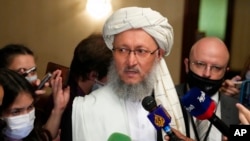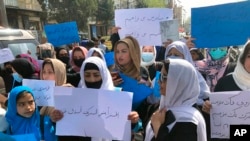Afghanistan’s Islamist Taliban have invited about 3,000 religious scholars and tribal elders from across the country to a meeting Thursday in Kabul, where officials said national unity would be discussed.
The men-only session in the Afghan capital is the first of its kind and is seen as an attempt to promote domestic legitimacy for the insurgent-turned-ruling group so it can secure much-needed international recognition.
The Taliban seized power from the internationally backed Afghan government last August, when the United States and NATO partners withdrew their final troops from the country after almost 20 years of military intervention.
Taliban Acting Deputy Prime Minister Abdul Salam Hanafi said Wednesday that prominent university professors, national businessmen and influential personalities would also attend the gathering, saying an Islamic system of governance and economics, as well as social issues facing Afghanistan, would be discussed.
'We respect them a lot'
“This will be a positive step for stability in Afghanistan and strengthening national unity,” Hanafi told state broadcaster RTA.
"The women are our mothers, sisters. We respect them a lot. When their sons are in the gathering, it means they are also involved, in a way, in the gathering," he said when asked whether female delegates had been invited to Thursday’s event.
No country has yet recognized the Taliban as legitimate rulers of Afghanistan, mainly because of their harsh treatment of women and girls. The Islamist rulers have suspended secondary education for most teenage girls, ordered women to wear face coverings in public and barred them from traveling beyond 70 kilometers without a close male relative.
The Taliban are also being pressed to govern the country inclusively and give all Afghan groups proper representation to ensure long-term national stability.
Critics questioned the legitimacy of Thursday’s grand meeting in the absence of women, who make up almost 50 percent of the country’s estimated 40 million population.
“An allegiance from 3,000 selected guests by [the] Taliban in a meeting will not help fix any of the problems [facing the country], nor confer any internal or external legitimacy to [the] Taliban,” said Torek Farhadi, a former Afghan official and political commentator.
“The book of God in Islam is gifted to women and men equally. Depriving women to have a voice in society is going against the precepts of Islam,” Farhadi told VOA.
The Taliban takeover and their subsequent installation of an all-male interim government prompted Washington and other Western countries to immediately halt financial assistance to largely aid-dependent Afghanistan, seize its foreign assets — worth more than $9 billion, mostly held by the U.S. — and isolate the Afghan banking system.
Economic upheaval
The action and long-running terrorism-related sanctions on senior Taliban leaders have thrown the cash-strapped country into a severe economic upheaval, worsening an already bad humanitarian crisis blamed on years of war and persistent drought.
The U.S. and the world at large have been urging the hardline group to reverse some of its curbs on women and ensure inclusive governance if it wants the global community to consider the Taliban’s demand for diplomatic recognition.
Taliban leaders have rejected calls for removing the restrictions on women, insisting they are in accordance with Afghan culture and Shariah, or Islamic law.
“Durable peace and reconciliation also require inclusive administration, represented by all political, religious and ethnic groups,” said Richard Bennett, the U.N. special rapporteur on the situation of human rights in Afghanistan.
“It is vital that national ethnic, religious and linguistic minorities, including minority women in Afghanistan, are included in all decision-making processes,” Bennett remarked at an online seminar Tuesday.
Rina Amiri, the U.S. special envoy for Afghan women, girls and human rights, while addressing the seminar, suggested rights-related issues would require engagement with the new rulers in Kabul.
“We try to identify very specific measures that the international community can consider and can try to move forward and also how we can press the Taliban to do more because they are right now the reality in the country,” Amiri said
Washington-based Freedom House, a pro-democracy organization dedicated to the expansion of freedom around the world, organized the seminar.





